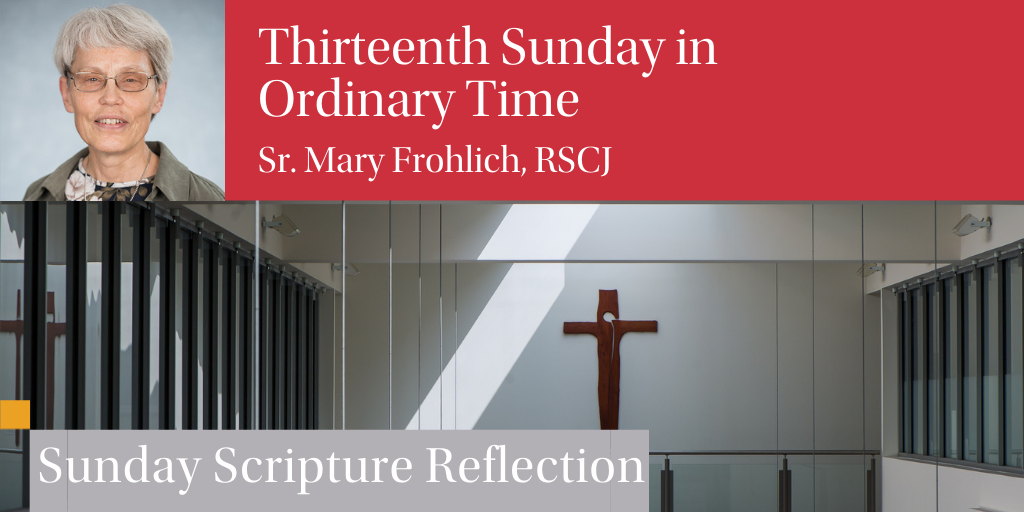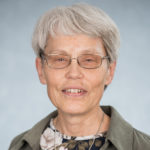

Readings:
Reading 1: Wisdom 1:13-5; 2:23-24
Responsorial Psalm: Psalm 30:2, 4, 5-6, 11, 12, 13
Reading 2: 1 Corinthians 8:7, 9, 13-15
Gospel: Mark 5:21-43
When the woman with a years-long hemorrhage touches Jesus, the LIFE that is in him flows through her like an electric current. Connected to that flowing radiation of the fullness of life, her whole being – body and soul – is reset. The inner wound that for twelve long years, day and night has been draining away her life is healed at last!
In this woman the manifestation of the wound was apparently gynecological, causing not only physical discomfort but also intense social shame and isolation. Many people carry similar inner wounds, though not all are manifested in actual physical bleeding. The characteristic of such an inner wound is that it is hidden, shameful, hopeless, and deadening. It convinces a person that fullness of life is only for other people; their own life is inferior and unimportant. Such a person avoids too much connection with others for fear of the shame of the wound.
When the woman in the gospel saw Jesus, something amazingly different happened. She perceived that the flow of life in and through this man was so radical that she was already connected to him, even before she touched him. This gave her the courage to take the step that, for twelve years, she had been too ashamed to take: she reached out to connect herself deeply to another person’s flow of life. She did it surreptitiously, still driven by shame. Jesus, however, would have none of that. He wanted to celebrate her breakthrough and embrace the fullness of life!
All the readings for today join in that celebration of the abundance of life that God is eager to bestow upon all the inhabitants of the Earth community. The Book of Wisdom even asserts that “God did not make death!” Scientifically, that is hard to reconcile with the reality that the cycle of life and death is essential to the continuation of life, since all living beings sustain their lives by feeding on other living beings in one way or another. Yet what the scriptures make clear is that God did not intend death to have the final word.
Death is not meant to be terrifying, but rather to be experienced as an essential element of the fullness of life. Jesus shows us this in his eucharistic self-giving: his death feeds and sustains others so that they can live in abundance. To live fully is to be willing to hand one’s life over into the great communion of ongoing life. The way First Corinthians articulates this is to say of Jesus, “for your sake he became poor so that by his poverty you might become rich.”
Of course, most of us, most of the time, do not fully “get” this. We instinctively avoid even small forms of poverty or death, let alone the radicality of actual death. Most often it is only when the sting of loss or diminishment cannot be avoided that we give our poverty to God in hopes that it may be fruitful for God’s reign. Yet what we miss in this resistance to letting go is that in reality, both divine and natural life are everywhere characterized by an overflowing abundance that is not diminished by the inclusion of death in its cycles.
It is true that as mortal creatures, we can suffer great losses. Yet if our hearts are awake, even in brokenness we will discover a different kind of riches. On the natural level, think of the millions of seeds, each one a miracle of beauty and fecundity, that pour forth from a single plant when it begins to wither and its seedpods break. On the divine level, we only have to look at Jesus on the cross to marvel at how abundant life pours forth from the ultimate poverty.
Recently I heard Native American spiritual teacher Pat McCabe make the startling affirmation that if one wants to live surrendered to the Spirit, “You have to want your life!” Life in the Spirit is not some ethereal proposition; it is the fullness and abundance of this life in our vulnerable, death-challenged, soul-full body. It took the woman with the hemorrhage twelve years – and a personal encounter with Jesus – to have the courage to awaken to this truth, and claim the fullness of her life!
Sr. Mary Frohlich, RSCJ
Professor Emerita of Spirituality